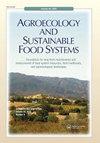Governance in Colombian food retail: a case study
IF 2.6
3区 农林科学
Q1 AGRICULTURE, MULTIDISCIPLINARY
引用次数: 1
Abstract
ABSTRACT We characterized three food retail models that coexist in Colombia: corporate, traditional, and alternative, and investigated the governance within each model in terms of regulation and transparency through a case study. We established the geographic density of the three models and found that in Colombia, the corporate model is widespread; the traditional model has low concentration, but a high presence; and the alternative model has a growing albeit low presence. Through our case study we found that these models have different behaviors in their core production, distribution activities, and forms of governance. Even though private regulation prevails in the corporate and traditional models, the traditional model contains specific characteristics of public regulation, while the alternative model is grounded on social regulation.哥伦比亚食品零售业的治理:一个案例研究
摘要:我们描述了哥伦比亚共存的三种食品零售模式:企业模式、传统模式和替代模式,并通过案例研究从监管和透明度方面对每种模式的治理进行了调查。我们建立了三种模式的地理密度,发现在哥伦比亚,企业模式普遍存在;传统模型浓度低,但存在性高;并且替代模型的存在率虽然较低,但仍在增长。通过我们的案例研究,我们发现这些模型在其核心生产、分销活动和治理形式方面有不同的行为。尽管私人监管在公司和传统模式中占主导地位,但传统模式包含公共监管的特定特征,而替代模式则以社会监管为基础。
本文章由计算机程序翻译,如有差异,请以英文原文为准。
求助全文
约1分钟内获得全文
求助全文
来源期刊

Agroecology and Sustainable Food Systems
AGRICULTURE, MULTIDISCIPLINARY-GREEN & SUSTAINABLE SCIENCE & TECHNOLOGY
CiteScore
4.80
自引率
7.70%
发文量
73
期刊介绍:
Agroecology and Sustainable Food Systems is devoted to the rapidly emerging fields of agroecology and food system sustainability. By linking scientific inquiry and productive practice with transformative social action, agroecology provides a foundation for developing the alternative food systems of the future. The journal focuses on the changes that need to occur in the design and management of our food systems in order to balance natural resource use and environmental protection with the needs of production, economic viability, food security, and the social well-being of all people.
Agroecology and Sustainable Food Systems examines our current food systems from production to consumption, and the urgent need to transition to long-term sustainability. The journal promotes the study and application of agroecology for developing alternatives to the complex problems of resource depletion, environmental degradation, a narrowing of agrobiodiversity, continued world hunger, consolidation and industrialization of the food system, climate change, and the loss of farm land. The journal uses a food systems approach, and seeks experiences in agroecology that are on-farm, participatory, change-oriented, and backed by broad-based methodologies of sustainability analysis and evaluation.
 求助内容:
求助内容: 应助结果提醒方式:
应助结果提醒方式:


